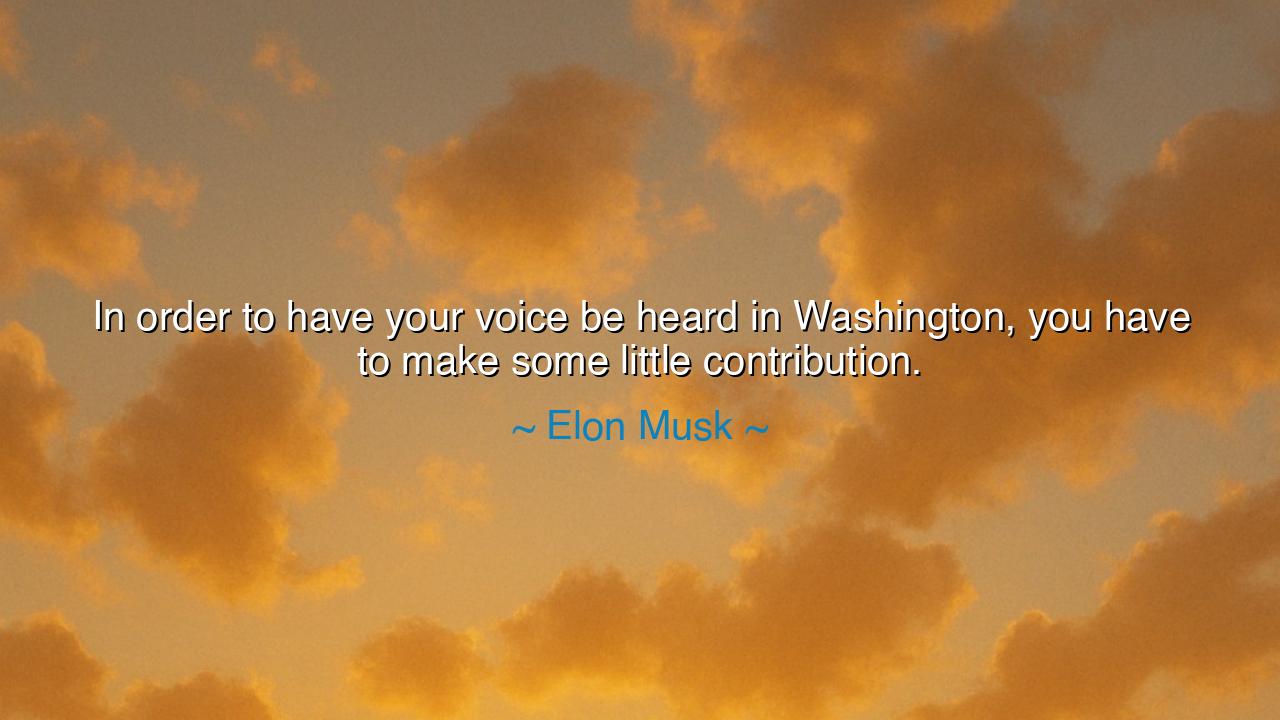
In order to have your voice be heard in Washington, you have to
In order to have your voice be heard in Washington, you have to make some little contribution.






The words of Elon Musk strike with the frankness of a man who has gazed into the heart of power: “In order to have your voice be heard in Washington, you have to make some little contribution.” Here he speaks not of lofty ideals, but of the harsh reality of politics—that influence in the halls of government is rarely gained by reason alone, but by contribution, whether in wealth, support, or alliance. It is a truth as old as empires: those who wish to shape decisions must place something upon the altar of power.
The ancients knew this well. In the Roman Senate, voices were rarely heard unless backed by patronage, wealth, or the favor of powerful allies. Cicero himself, though famed for his oratory, relied on alliances with Caesar, Pompey, and Crassus to amplify his voice. Without such “contributions,” even the wisest counsel could be ignored. Musk’s words are but a modern echo of this ancient pattern—that access to rulers often requires more than truth; it requires tribute.
Consider the story of the Gilded Age in America, when industrial titans like Andrew Carnegie and John D. Rockefeller poured wealth into politics. They did not always buy favors outright, but their “little contributions” ensured that their voices carried farther than the cries of ordinary men. Reformers denounced this, yet it remained true: in a system where money fuels campaigns, contributions open doors that words alone cannot. Musk, in his blunt manner, reveals this enduring reality.
Yet his saying is also a warning. If the voices of the people are heard only through contributions, then democracy risks becoming the domain of the wealthy, where the poor cry out but remain unheard. The spirit of justice demands that truth be weighed for its own sake, not by the coin that carries it. Musk’s words, though spoken plainly, shine light upon this imbalance, reminding us that the cost of entry to political discourse is too often a price many cannot pay.
Let the generations remember: influence bought is influence weakened, for it serves not always the common good but the donor’s interest. True leadership must strive to hear even those who bring no gold, for wisdom may dwell in the voice of the humble as well as the mighty. Musk’s words reveal the reality of the present age, but they also challenge us to dream of a future where the strength of ideas, not contributions, determines who is heard in the councils of power.






MHNguyen minh hieu
Musk’s statement reflects a certain cynicism about the way influence works in Washington. It seems to suggest that without making some sort of 'contribution,' your voice is unlikely to be taken seriously. How does this impact the general public’s trust in the political process? If only those who contribute have the ability to influence change, how do we ensure that the voices of ordinary people are still valued in a meaningful way?
VTTran Van Thao
The quote suggests that access to power, especially in Washington, may not be about having a great idea or solution, but about contributing in ways that gain attention. Does this diminish the role of true representation, where elected officials are meant to serve the public, not just those who can contribute? Should there be a way to make political participation more inclusive, without requiring financial or other types of contributions to be heard?
HLTran Hoang Long
Musk’s comment about making a 'little contribution' to be heard in Washington raises an interesting point about the nature of political influence. Does this imply that political participation has become transactional, where people need to give something—be it money or influence—to gain attention? How does this affect the broader notion of democracy, where every citizen is supposed to have an equal say? Is this the reality of how modern politics works?
TDThuy Tien Dao
Elon Musk’s statement highlights the idea that influence in politics often comes down to making a contribution, even if it’s small. Does this suggest that only those who contribute financially or have power are truly heard in Washington? How much of this is reflective of how our political system operates today—where donations and lobbying seem to have a bigger impact than public opinion? Is it still possible for ordinary citizens to have their voices heard in such a system?